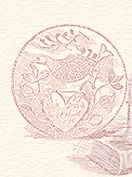Ihr liewe Leit:
Ich weess ass Faschtnacht noch en paar Woche weck iss, awwer's iss
net zu frieh fer lanne wie mer sich an dem Daag bedraage muss.
Wie ihr liewe Leser villeicht schunn wisst, sin die Deitsche
menschdens Broddeschdande, un ver alders hen sie nix vun denne Kanniwal
gewisst ass die Gadollische so gegliche hen. Die Deitsche hen an dem Daag
graad geduh was sie an annere Dinschdaage geduh hen: sie hen graad im Haus, in
der Scheier un villeicht uffem Feld weidergschafft.
Awwer wie ihr eich denke kennt, hen die Deitsche ihre Gebreiche
ghatt. Zum Beischpiel, hoffentlich scheint die Sunn schee lang an dem
Dinschdaag, weil darrich die Faschtzeit griege mer aller Daag graad so viel
Sunneschei ass mer an der Faasenacht griege. Un wann es dunnert un dennoh en
schtarriger Wind kummt, warre die Bauer viel Frucht griege. Sell iss gewiss
waahr.
Un wann ihr Weibsleit es Haus butze, dann misst ihr der Schtaab un Dreck
iwwer die Leinfens schmeisse. Dann kummt's Umgziffer nimmi ins Haus fer's gans
Yaahr. Awwer ihr darreft net neehe, schunnscht lege die Hinkel net, un die
Schlange kumme im Friehyaahr rei ins Haus! Yeder weess des.
Un ihr Holshacker datt draus. Wann ich ihr waer, deet ich awwer an
der Faasnacht kens Hols hacke. Nee, ich deet mer villeicht ins Bee nei hacke,
un wie mer all wisse, dutt ken Axwund an dem Daag heele. Ich deet iwwerhaabt
ken scharrefe Waerkzeich yuuse, graad deweil Wunde an dem Dinschdaag net recht
heele wolle.
In deel Gegende hen die Kinner als der letscht Schuler aus der Schul "die
Faasenacht" gheesse. Awwer sell waar net so schlimm. Nee, es hett gewiss
schlimmer sei kenne - mer hett an sellem Daag der letscht aussem Bett sei
kenne, un sell waar en Sin un en Schand! Der aerscht wu uffgschtanne iss waar
der Hauslumbe, odder die Gluck, odder der Gansert, odder der Schpiellumbe
Suckler. Awwer sell waar beschtimmt net so schlimm. Nee, mer hett der letscht
sie kenne, wu uffgschtanne iss. Dann waar mer DIE FAAS(E)NACHT (odder graad
die Faas) - un sell, wie gsaat, waar en Schand.
Wann mer die Faas waar, waar mer der gans Daag ausgeschpott warre,
un mer hot viel Arrewet zu duh ghatt. Mer hot die Bedder mache misse, die Esch
nausbringe un es Hols reibring misse, un die Arrewet in der Scheier duh misse.
Awwer wann mer vun der Schul heemkumme iss, do waar die Memm
Faschtnacht Kichelcher am Mache. Nau, bischt du Deithsch odder net, du musscht
an der Faasenacht Fassenacht Kickelcher esse. Gewiss, sell MUSS mer duh. Awwer
net yedes Donut iss en Faschtnacht Kickelcher! Meh neegscht Woch.
Macht's gut,
Der Alt Professer
|
Dear people:
I know that Shrove Tuesday is still a couple of weeks away, but it
isn't too early to learn how one must behave on that day.
As you dear readers perhaps already know. The Pennsylvania Dutch
are mostly Protestants, and long ago they knew nothing about those
carnivals that the Catholics liked so much. The Germans did on that day
exactly what they did on any other Tuesday: they just carried on working
in the house, in the barn and perhaps in the fields.
But as you can
imagine, the Dutch had their customs. For example, hopefully the sun will
shine nice and long on that Tuesday, because through Lent we will get
every day just as much sun as we get on that Shrove Tuesday. And if it
thunders and after that a strong wind comes, the farmers will get a lot of
grain. That is certainly true.
And if you women clean the house, then you must throw the dust and
dirt over the line fence. Then the vermin will not come into the house for
the whole year. But you must not sew, otherwise the chickens won't lay,
and in the spring the snakes will come into the house! Everybody knows
that.
And you wood choppers out there, if I were you, I would not at all
chop wood on Shrove Tuesday. No, I would perhaps chop into my leg, and we
all know, no axe wound will heal on that day. I would use no sharp tools
at all, exactly because wounds on that Tuesday do not rightly want to
heal.
In some areas the children used to call the last pupil out of school the "Faasenacht".
But that was not so terrible. No, it could have been certainly worse-one
could on that day have been the last one out of bed, and that was a sin
and a shame! The first one who got up was the "cleaning rag" ("dust rag"),
or the "cluck" ("hen") or the "gander" ("goose"), or the "dishrag sucker".
But that certainly was not so bad. No, one could have been the last one
who got up out of bed. Then you were THE FAASNACHT (or just the Faas) -
and that, as we have said, was a shame.
When you were the Faas, you were the whole day made fun of, and you
had a lot of work to do. You have to make the beds, take out the ashes and
bring in the fire wood, and had to do the work in the barn.
But when one got home from school, Mom was making Shrove Tuesday
cakes (donuts). Now whether you are a Pennsylvania Dutchman or nut, you
must eat these kinds of donuts on Shrove Tuesday. Certainly, you MUST do
that. But not every donut is a Shrove Tuesday cake! More next week.
Take care,
The Old Professor
|













